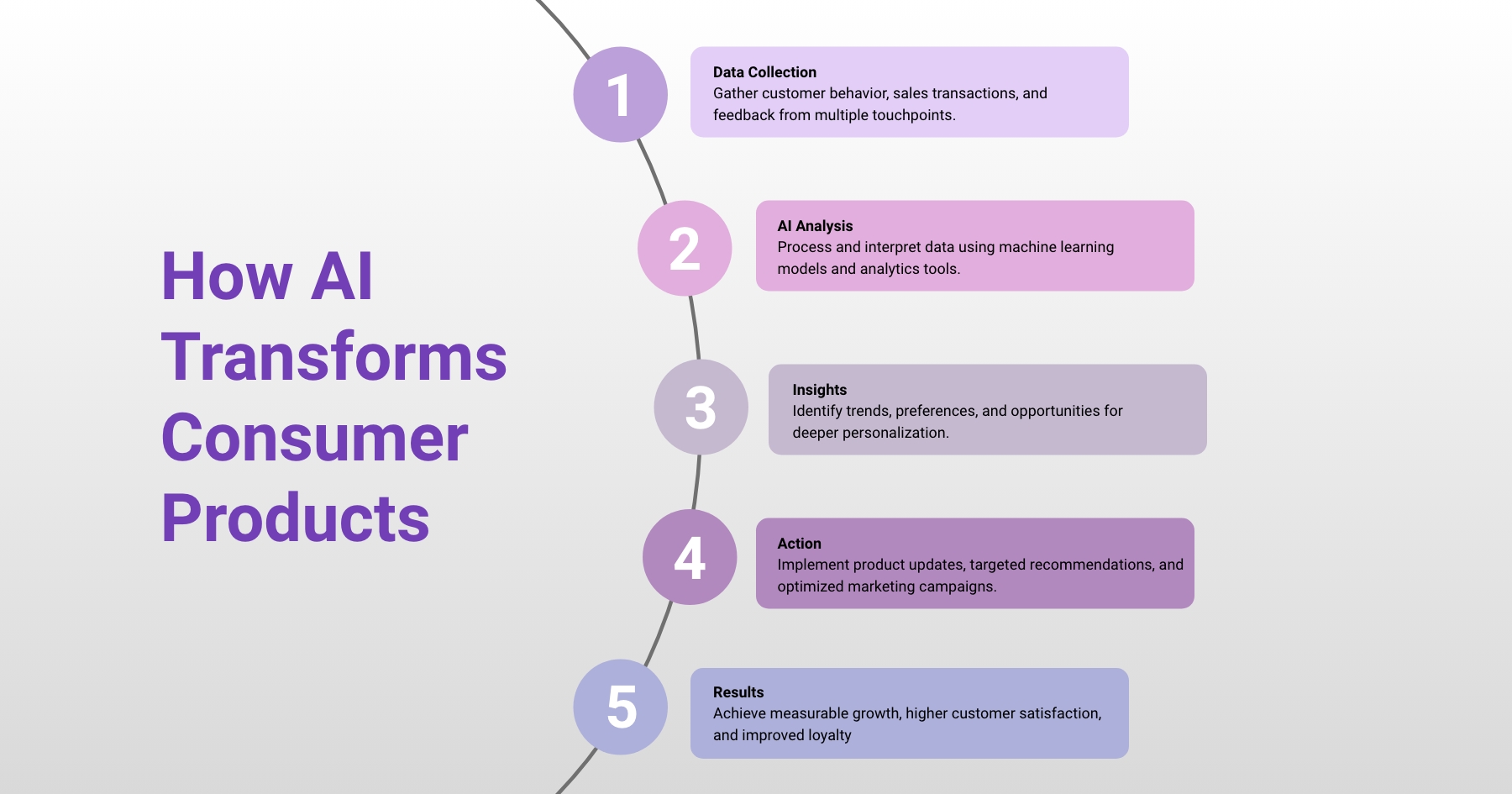
AI in Consumer Product
Brief Definition
AI in consumer products refers to the application of artificial intelligence technologies to enhance the development, optimization, and personalization of consumer goods. This includes AI product recommendation engines, consumer product analytics, and AI-driven customer insights to improve the product lifecycle from design and production to marketing and customer engagement.
Detailed Definition & Explanation
AI in consumer products is transforming how brands design, market, and personalize products for consumers. Through AI product optimization, companies can analyze consumer behavior, forecast demand, and refine features based on insights gathered from data. AI-driven customer insights allow businesses to understand preferences, predict trends, and adjust offerings accordingly, enabling more effective and targeted marketing.
Personalization plays a significant role with AI product recommendation systems, which utilize consumer data analytics to suggest products that align with individual preferences. AI in product development also supports innovation by analyzing trends and performance data to streamline production and reduce time to market.
The impact of AI in consumer goods industry transformation is profound, enabling brands to scale more efficiently, connect with customers on a deeper level, and anticipate future needs. AI-powered personalization in consumer products can drive customer loyalty, increase sales, and enhance the overall brand experience.
Types of AI Applications in Consumer Products:
1. Product Personalization
Using AI to tailor products, services, and experiences to individual customer preferences based on real-time data.
2. Consumer Insights and Analytics
Leveraging AI to process vast amounts of customer data to extract actionable insights and predict behaviors.
3. AI for Product DevelopmentAnalyzing market trends, consumer needs, and feedback to inform product design, innovation, and iteration.
4. Product OptimizationEnhancing existing products by integrating AI-driven feedback loops from consumers to improve quality, performance, and relevance.
5. AI-Driven RecommendationsAI systems that personalize shopping experiences by recommending relevant products based on past behaviors and preferences.
Why It Matters
-
Drives Smarter Product Development
With AI-driven customer insights and consumer product analytics, companies can predict which features, designs, and trends will resonate with target audiences. AI helps design teams iterate faster and more effectively, reducing development costs and speeding up time to market.
-
Enhances Personalization and Customer Experience
AI product personalization leads to deeper customer engagement by offering tailored recommendations and experiences based on individual needs. Whether through personalized advertisements or product suggestions, AI enhances customer satisfaction and drives repeat purchases.
-
Optimizes Marketing Campaigns
AI product recommendation systems use real-time customer data to predict buying patterns, enabling brands to target their audience more effectively. This improves conversion rates and ensures that marketing campaigns are personalized, relevant, and impactful.
-
Improves Operational Efficiency
By using AI for product optimization, brands can analyze post-launch feedback, consumer behavior, and sales trends to continuously improve products. This leads to better resource management and reduces inefficiencies in the production and marketing processes.

Real-World Examples
The use of AI is reshaping how consumer product brands engage with customers and optimize their offerings. These examples showcase how AI is being applied to drive innovation and efficiency:
FD Ryze
FD Ryze leverages AI-driven customer insights and AI product recommendation systems to enable personalized experiences across e-commerce platforms. By automating product recommendations and analyzing customer behavior, FD Ryze helps brands create smarter customer journeys, improving conversion rates and satisfaction.
Amazon
Amazon uses AI product recommendation engines to suggest relevant products to users based on browsing history, purchase patterns, and search data. Their algorithm continually refines product suggestions, making it an essential driver of their massive e-commerce success.
Nestle
Nestle employs AI in product development to create consumer-driven products by analyzing large datasets on customer preferences, market trends, and purchasing behavior. Their AI tools help identify gaps in the market and design products that cater to evolving customer needs.
What Lies Ahead
-
AI-Driven Innovation Will Revolutionize Product Development
As AI-powered data analytics continue to evolve, product teams will be able to use machine learning algorithms to predict customer preferences and market trends with even greater accuracy. AI in product development will play an increasingly central role in how consumer goods are conceptualized and created.
-
Hyper-Personalization Will Become the New Standard
AI-driven personalization will evolve beyond just recommending products; it will create unique, tailored experiences at every touchpoint. Brands will move toward creating fully customized shopping experiences, leveraging real-time data to adapt their offers and interactions with individual customers.
-
AI-Driven Operations Will Optimize the Entire Product Lifecycle
AI in consumer products will go beyond marketing and personalization. Automation and predictive AI will help brands optimize their entire product lifecycle, from design and manufacturing to distribution and customer service, reducing waste and improving speed and efficiency.
-
Voice Commerce and Smart Products Will Drive the Future
With the rise of smart consumer products integrated with AI, consumer goods brands will increasingly focus on voice commerce and IoT-enabled experiences. AI will power everything from voice-based shopping assistants to autonomous, smart appliances, creating new consumer engagement avenues.
